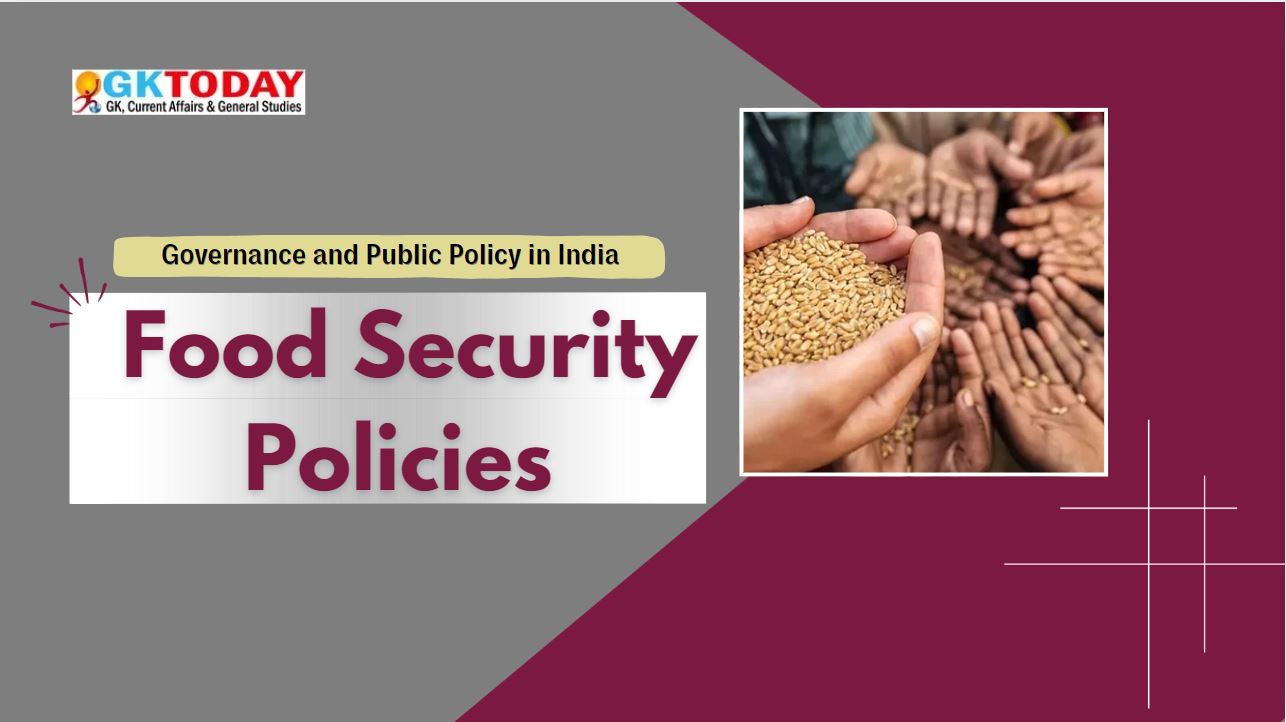Food Security Policies in India UGC-NTA NET Political Science
Food security is important aspect of socio-economic development in India. It ensures that all individuals have access to sufficient, safe, and nutritious food.
Definition of Food Security
Food security refers to the condition where all people have physical, social, and economic access to adequate food. This food must be safe and nutritious to meet dietary needs. The definition encompasses four key pillars:
- Availability: Sufficient food supply through production and imports.
- Access: Economic and physical access to food.
- Utilization: Proper biological use of food, requiring knowledge and resources.
- Stability: Consistent access to food over time.
Importance of Food Security
Food security plays a vital role in several areas:
- Health and Nutrition: It is essential for maintaining health and preventing malnutrition.
- Economic Stability: A stable food supply supports economic growth.
- Poverty Reduction: It helps decrease poverty levels and inequality.
- Social Stability: Ensures political stability and social cohesion.
Historical Context in India
The history of food security in India includes developments:
- Green Revolution (1960s): Introduced high-yielding varieties of seeds and modern agricultural practices.
- Public Distribution System (PDS): Established to combat food scarcity and ensure food access.
Key Food Security Policies in India
Several policies have been implemented to enhance food security:
National Food Security Act (NFSA), 2013
The NFSA aims to provide subsidised food grains to about two-thirds of India’s population. Key features include:
- Entitlement of 5 kg of food grains per person per month at subsidised rates.
- Special provisions for vulnerable groups such as pregnant women and children.
Public Distribution System (PDS)
The PDS is a network for distributing food grains and essential commodities. It operates through fair price shops, ensuring food access to low-income families.
Integrated Child Development Services (ICDS)
The ICDS programme aims to improve the nutritional and health status of children under six years and pregnant or lactating women through various services.
Mid-Day Meal Scheme
This scheme provides free lunches to school children. It aims to enhance nutritional status and promote school attendance.
National Nutrition Mission (NNM)
The NNM focuses on reducing malnutrition among children, adolescents, and women through targeted interventions.
Implementation Mechanisms
The implementation of food security policies involves several stakeholders:
- Ministry of Consumer Affairs, Food and Public Distribution: Oversees food security programmes.
- State Governments: Play important role in distribution and monitoring.
- Technology Utilisation: Aadhaar is used for identification to streamline benefits.
Challenges in Food Security
Despite efforts, several challenges persist:
- Inefficiencies in PDS: Issues such as leakages and corruption hinder effectiveness.
- Regional Disparities: Variations in food availability and access across states.
- Climate Change: Adverse effects on agriculture impact food production.
- Nutritional Quality: Focus on caloric intake rather than nutritional value.
- Economic Barriers: Poverty limits access to quality food.
Recent Initiatives and Reforms
In response to challenges, India has introduced several initiatives:
Pradhan Mantri Garib Kalyan Anna Yojana (PMGKAY)
This scheme was launched during the COVID-19 pandemic to provide free food grains to the poor, ensuring food security during the crisis.
Direct Benefit Transfer (DBT)
DBT aims to reduce leakages by transferring subsidies directly to beneficiaries’ bank accounts. This promotes transparency and efficiency.
Promotion of Sustainable Agriculture
Initiatives encourage organic farming and reduce reliance on chemical fertilisers, aiming for long-term sustainability.
International Commitments and Frameworks
India aligns its food security policies with global commitments:
- Sustainable Development Goals (SDGs): Particularly Goal 2 – Zero Hunger.
- Global Partnerships: Participation in international food security initiatives.
Monitoring and Evaluation
Effective monitoring is essential for assessing food security:
- Data Utilisation: Technology helps track food security indicators.
- National Sample Survey Office (NSSO): Plays a key role in data collection.
Future Directions
The future of food security in India requires strategic planning:
- Policy Integration: Combining food security, nutrition, and health initiatives.
- Climate-Resilient Practices: Emphasising sustainable agricultural methods.
- Strengthening Local Systems: Promoting local sourcing to enhance food availability.
Thus, food security policies in India are vital for socio-economic development. They address the needs of the population and aim to create a stable and healthy society. Continuous evaluation and adaptation of these policies are necessary to overcome challenges and meet future demands.



